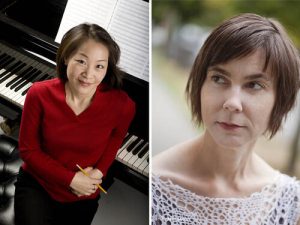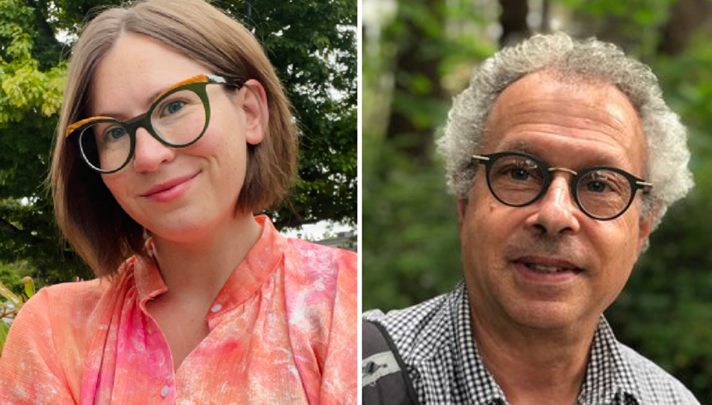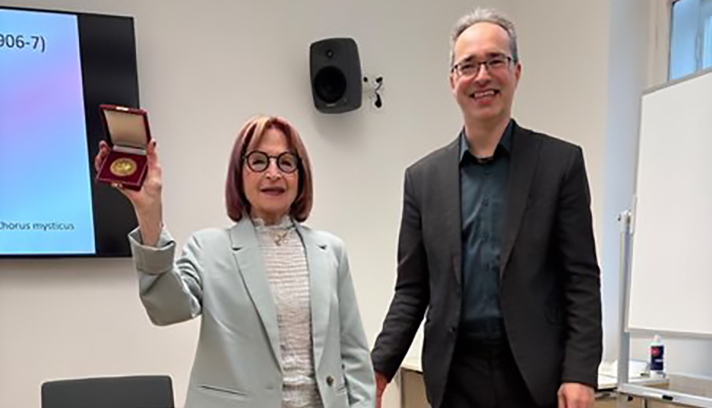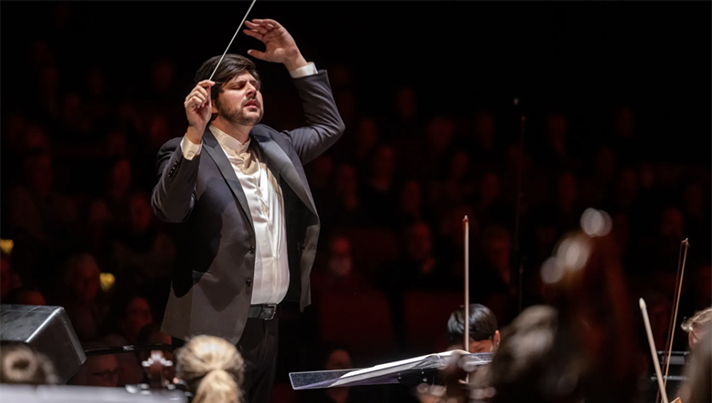Award-winning composition faculty Dr. Dorothy Chang and Dr. Jocelyn Morlock talk about writing music in dialogue with Beethoven, creating art in a pandemic year, and what it means to be a contemporary composer
By Tze Liew


UBC’s Dr. Dorothy Chang and Dr. Jocelyn Morlock
This year promised to be an auspicious one for faculty composers Dr. Dorothy Chang and Dr. Jocelyn Morlock. As two of Canada’s most exciting classical contemporary composers, they were commissioned by the Calgary Philharmonic Orchestra to write for Beethoven 250, a concert celebration series in which their works would be performed alongside five iconic Beethoven symphonies.
Then the pandemic struck — putting this and many other projects on hold.
Now the Beethoven commissions, though completed, lie waiting on the page. The composer community is adapting to the times, forgoing (for now) large orchestral compositions in favour of solo and small chamber works that have a better chance of being performed.
The world has changed, but the music must go on. High Notes sat down with Dr. Chang and Dr. Morlock to talk about writing music in dialogue with Beethoven, creating art in a pandemic year, and what it means to be a contemporary composer.
We’re crossing our fingers that we get to hear your Beethoven 250 compositions performed soon. What were the special challenges/pleasures of working on a commissioned piece in dialogue with Beethoven?
Dorothy Chang: For Skizzen, the piece I wrote as a companion to Beethoven’s Fifth Symphony, I took inspiration from Beethoven’s famous sketchbooks, which contain notes and ideas for his Fifth Symphony. I sought not to recompose Beethoven’s music but instead to reference his ideas in raw form, when they were still merely flashes of inspiration and not yet developed into a complete work. Skizzen quotes a number of Beethoven fragments, at times distinctly recognizable and elsewhere transformed, spinning off in new directions and interpretations, much as a composer would explore the potentialities of a musical germ during the composition process.
One challenge of using Beethoven’s ideas as source material was to find the intersection with my own voice. In some instances I tried to do this smoothly; in others I intentionally highlighted the contrast between his musical voice and my own. One pleasant surprise I found in working so closely with his material was the new insight I gained on some of his compositional techniques. I was familiar with the symphony, but had never before studied it this closely. It was interesting to find tight motivic connections between the four movements that I hadn’t previously recognized, as well as some curious voicing and orchestration choices he made.
So much of what’s on a classical music concert is kind of a museum piece — which is unfortunately static, and of the past. I would love to see it keep growing and invite in other music that expresses other things, and to expand to reflect our own times.
— Dr. Jocelyn Morlock
Jocelyn Morlock: I wrote a companion piece to Beethoven’s Symphony No. 4, titled Interloper — as in someone or something that doesn’t quite belong here. That’s partly because of the feeling I think any composer would certainly get when your music is being showcased next to Beethoven’s: how could I, or any mere mortal, possibly compete with the canonical, famous works of a genius that have withstood the test of time?
I started my research and interestingly, found that Beethoven didn’t really fit in the society that he was aspiring to. He wasn’t the phenomenal Beethoven we know today, but just another composer who was trying to make a living, got bad reviews and made music that was considered wrong by the mainstream. He was kind of the anti-establishment in his day.
For example, his 4th symphony is clearly labelled in B-flat major, and people would’ve had set expectations about what a symphony in B-flat major should sound like – at least, they’d expect that it would start in the major mode. But Beethoven’s symphony starts in this slow, weird minor, like he’s kind of messing around with people’s minds. It makes me happy that he would do that. Weirdos of the music world, unite!
So in my piece, I played with this idea of consciously knowing I don’t fit in, but also that Beethoven didn’t fit in in his time, so we are thus somewhat connected. I started with B-flat, as he did, and then spun off into my own thing. The idea of starting from a unison and then gradually expanding and colouring it with different textures and adjacent notes, starting from the general concept okay, this is not what somebody would have expected, so what can I do with that? was kind of fun. Interloper has many parts that are pseudo-Beethoven, that flicker in and out of his world, and then go off into my own world.
What was it like composing the Beethoven commissions as the world was shutting down?
Dorothy Chang: I was about 70% done with the piece when the pandemic hit and everything shut down. With an immunocompromised family and a fear of the unknown, I stopped writing for three weeks and went into survival mode: trying to figure out how to keep ourselves safe, stocking up on food and essentials, shifting to schooling my daughter at home, and obsessively following the news.
As I slowly returned to composing while isolating at home, it was surreal and challenging to read increasingly distressing, heartbreaking and horrific news of the spreading pandemic, mounting death toll, escalating racism, anti-lockdown protest, and atrocious incidents of police brutality. With this seemingly apocalyptic world as a mental and emotional backdrop, I really struggled to recapture my pre-COVID headspace and continue writing my whimsical Beethoven piece. I eventually completed it, but it was an overwhelming challenge to do so.
Jocelyn Morlock: It was odd to be working on Interloper as the world ground to a halt due to Covid-19. The more surreal aspects of the piece, where Beethoven’s world and the modern world collide, seemed all right to deal with, but I found trying to write a conclusion to the work was almost impossible. After trying a number of possibilities, I ended up writing a very ambiguous but somewhat menacing ending, because writing anything didn’t work with the strange and disturbing times we’re living in.
What are you working now, during these crazy times?
Jocelyn Morlock: I haven’t been writing a lot of music in the past couple of months. I have been more focussed on learning about the world we’re living in, especially with regard to Indigenous rights and decolonization, and more generally about classical music culture. I have also been spending some time learning/playing with Logic audio (Logic Pro X) – it’s about time I did that… One thing I have created recently is an imagined composition, called Memorial, for Of-the-Now, as part of their Decolonial Imaginings workshop/project.
Dorothy Chang: I’m currently working on a few projects that have been developed in response to the new reality of music-making in COVID times. I’ll be writing several solo songs for different members of the Cantata Singers in Boston; these pieces are to reflect on some aspect of the past 10 months, since the pandemic began. I’m also writing a new solo harp work for Janelle Nadeau as part of the Turning Point Ensemble’s 1+1+1… project.
A lot of the music you both make pushes the boundaries of what we think of as classical music. Why do you think that’s important?
LISTEN: “Invisible Distance for Cello and Orchestra”
Dorothy Chang: On a personal level, I find it more important to push the boundaries of myself as a composer rather than contemporary music as a whole. That being said, I do think that the boundaries of classical music are being pushed simply by the arts being a reflection of the ever-changing cultural and societal context in which we as artists live.
LISTEN: “Bioluminescence (wine-dark sea)
Jocelyn Morlock: So much of what’s on a classical music concert is kind of a museum piece. They’re part of a canon which is unfortunately static, and of the past. I would love to see it keep growing and invite in other music that expresses other things, and to expand to reflect our own times. As opposed to what happened 200 years ago, modern art reflects what’s going on right now, and that’s important – maybe more important than re-performing older art over and over (ideally, we don’t have to choose.) I hope that many different kinds of contemporary music will survive and thrive, even in 2020, so people will find something that is meaningful to them. I don’t like the idea of trying to tell people that new music is good for you, the way broccoli is good for you. So I hope there will be many different musical events and styles for people to find something that resonates with them.
How would you describe your compositional language/style?
LISTEN: “Ornithomancy”
Jocelyn Morlock: I suppose it’s frequently tonal or modal, but I do enjoy this space between the notes or somewhat expanded tonal palette. I tend to write narratively and there’s usually some kind of an emotional journey behind the piece, or exploration of a psychological state. I’m not a super abstract composer.
Dorothy Chang: Much of my music is inspired by a specific emotion or state of mind, often in reaction to an external stimulus such as an image, a poem, a natural phenomenon or an event. Typically, the first creative spark of a new piece is simply a single gesture or colour.
What is your composition process usually like?
LISTEN: “Afterlight”
Dorothy Chang: The process varies from piece to piece, but typically I begin with a single idea. This could be an overall concept, an actual fragment of music, a certain colour or even a feeling I wish to convey. I rarely dive immediately into a work; more often, I’ll ruminate on the ‘germ idea’ for quite some time, mentally exploring its potential in various ways and jotting down notes for consideration. Once I have a stronger sense of what the overall piece might be, I’ll begin more detailed work on the larger structure, pitch and harmonic content, and the sketching of actual music. My process is very much like sculpting: each piece begins as a very raw and crude version, and throughout the composition process I am constantly chiseling away at the music, gradually refining and polishing until I feel I’ve accomplished as much as I can with it.
Jocelyn Morlock: Despair, frustration…*laughs* I’m an improviser. I’ll go play things on the keyboard till I find something I like. I’ll record fragments, write down scribbly bits of music on paper before I bring them to the computer. I keep a notebook to write down ideas, notes and questions to myself about what I’m doing and why. It’s a lot of problem solving, and when things don’t work, having ideas on paper helps me figure things out. Improvising really helps – it’s a fairly intuitive process for me.
Can you describe a turning point/the most incisive moments in your career?
LISTEN: “Lost and Found” for mixed Chinese and Western ensemble
Dorothy Chang: A turning point in my development as a composer was when I went to study abroad in Nanjing, China during my graduate years. At the time, I was starting to feel an unsettling disconnect between the contemporary music that was presented as ‘models’ for composition in my music courses, and my own musical voice that I was struggling to define as a third culture person.
As the child of Chinese immigrants who arrived in the US by way of Taiwan, I grew up with an uneasy balance between my Chinese upbringing at home and the culture of white middle-class Midwestern suburbia in the US. In my teens, this was further complicated by my parents’ move back to Taiwan, where I was too American to fit in as a local, so attended an international school with other culturally-displaced kids — we’re often described as “citizens of everywhere and nowhere.” Moving back to the US to attend university I again experienced culture shock, rather than a feeling of returning home.
Searching for a deeper musical connection to my Chinese heritage, I went to Nanjing to study the music of contemporary Chinese composers. This gave me formal insight on Chinese music and how Chinese composers incorporate Eastern and Western elements in their music, but I felt no stronger connection to this approach than I did to that of the predominantly white, male European composers of the musical canon. Ultimately, I came to the realization, or acceptance, that I needed to embrace the musical influences from all my cultures — including that of the very specific “Chinese-American-displaced-in-Taiwan-as-a-foreigner” — in order to feel that my musical voice was truly genuine. This was a puzzle that took almost 15 years to resolve.
LISTEN: “half light, somnolent rain”
Jocelyn Morlock: In 1999, after my dad died, I was having a crisis about my music, and everyone’s music for that matter. I didn’t know what I wanted it to sound like, nothing I was hearing seemed significant, nothing resonated with me. I was wondering whether to quit school, quit composing. One day I went into the music library and a friend of mine (David Byrne – no relation to Talking Heads) was working at the desk and said to me: “you have to listen to this.” It was a Sony Classical CD called “A New Heaven” with a piece on it called “Hymn No. 3 in Honour of Gustav Mahler” for large orchestra and soprano. It struck me as epically beautiful, spiritual, transformational.
Nikolai Korndorf had written this music. He was a quiet, intense man, living in Burnaby at the time, who was auditing our computer music class. I came out of the listening room about an hour later, thinking “this is what I want music to do – this is what music can be.” So, I didn’t quit. I was very lucky that I was able to study with Nikolai Korndorf from the end of 1999 until his untimely death in May of 2001.
Which works are you most proud of and why?
Listen: “Exaudi”
Jocelyn Morlock: I wrote a piece for choir and cello in memory of my grandmother, that explored her relationship with religion and the idea of death as comfort. The piece moves from this awful space and gradually becomes more calm and serene. The idea of death, instead of being something horrible, becomes something sort of restful. It was something my grandmother was ready for at the end of her life – she died when she was almost 90 – so she felt like she’d had a full life. It’s still hard for me to imagine the feeling of death as a comfort and something you could almost look forward to, but that’s the trajectory of the piece. It’s a cathartic piece, and it means a lot to me.
LISTEN: “My Name is Amanda Todd”
Another work I’m proud of is My Name is Amanda Todd, because I wrote it having met Carol Todd and I thought it was a really important message. Working with Carol, the piece said what she wanted to say also – we didn’t want it to be just a memory of Amanda as a victim, but rather to say who Amanda was and celebrate her strengths and to be a message of hope for people suffering from cyberbullying or mental wellness issues, and also to raise awareness of these issues, and of resources where people can go for help.
Dorothy Chang: I’m quite happy with my piece Lost and Found for mixed Chinese and Western ensemble.This was the first work I wrote in which I feel I succeeded in combining Chinese and Western influences in a way that reflected my own cultural identity. Another piece that I’m fond of is a collaboration with writer Adam Frank on an adaptation of Gertrude Stein’s play White Wines. This was written for four female vocalists and a female speaking percussionist. This project was designed to be an open exploration of the various ways in which text and music might intersect, and I enjoyed the freedom and lack of creative constraints. I’m very process-driven with regard to collaboration, and this was one of my most gratifying collaborative experiences. I think the resulting piece captures much of the whimsy and joy of that was part of the creative and collaborative process.
Any ideas/advice to impart to aspiring composers?
Dorothy Chang: Write music that you love, though always push to expand what that encompasses. Listen to all kinds of music, keeping an open mind. Foster meaningful relationships and connections with performers, composers and the music community in general – no composer can succeed without others.
Jocelyn Morlock: Keep playing, exploring and making music in all the ways you want to. It’s not just about writing stuff down, because there’s lots of other ways of transmitting and creating your music, whether it’s electronic or live or however you want. Don’t limit yourself. And ideally, try to find performers who your music resonates with, because you can build so much from that.
In terms of success, big breaks come from lots of little breaks — I was doing all kinds of jobs, from freelance composing to touring librarian — doing whatever came along until one thing led to another. Just be open to the possibilities.
About Dr. Chang
Described as “evocative and kaleidoscopic” (Seattle Times), Dorothy Chang’s music often reflects the eclectic mix of musical influences from her youth, ranging from popular and folk music to elements of traditional Chinese music. Many of her works are inspired by place, time, memory and personal histories. Dorothy’s catalog includes over seventy works for solo, chamber and large ensembles as well as collaborations involving theatre, dance and video.
About Dr. Morlock
JUNO Award-winning composer Jocelyn Morlock’s music is hailed as being “airy but rhythmic, tuneful but complex” and with “uncanny yet toothsome beauty” (Alex Varty, Georgia Straight). Her music is inspired by birds, insomnia, nature, fear, other people’s music and art, nocturnal wandering thoughts, lucid dreaming, death, and the liminal times and experiences before and after death.



